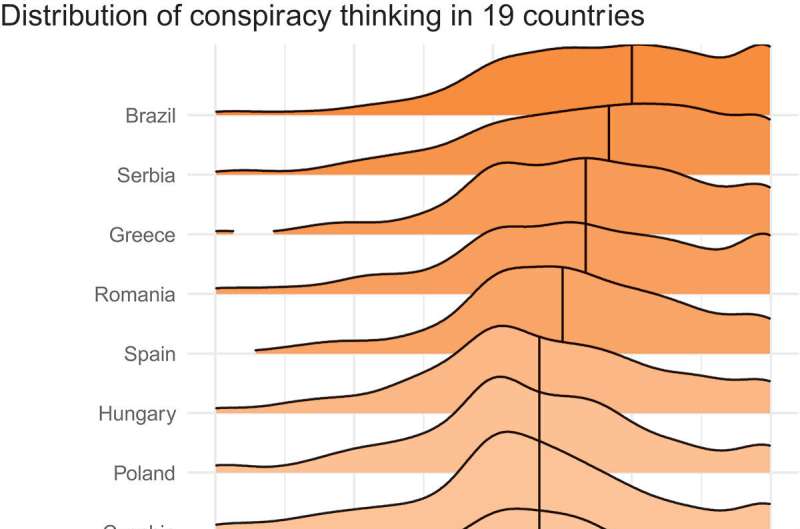This article has been reviewed according to Science X's editorial process and policies. Editors have highlighted the following attributes while ensuring the content's credibility:
fact-checked
trusted source
proofread
Study shows impact of Russian social media campaigns less pronounced than often assumed

Most people do not believe the disinformation spread by Russia about the war in Ukraine, even if they regularly use social media. Instead, the decisive factor in the efficacy of this propaganda is whether a person is fundamentally receptive to conspiracy narratives.
These are the findings of an international research team led by the Technical University of Munich (TUM) in around 20 European and American countries. The respective proportion of people who believe Russian assertions differs substantially. The paper is published in the journal Political Communication.
Social media is considered a hugely effective means of anchoring false information in the public consciousness. During its attack on Ukraine—which has been dubbed "the first TikTok war"—Russia has relied heavily on social media to spread its narrative.
But is flooding social media with content actually an effective way to influence large swaths of the population? An international research team led by scientists of the Munich School of Politics and Public Policy at TUM examined this issue in the first phase of the Russian attack on Ukraine.
In April and May 2022, they surveyed around 1,000 people in each of 19 countries, including Germany and other EU member states, the U.S., the United Kingdom and Brazil. The respondents indicated the degree to which they agreed with two assertions disseminated by Russian state actors: firstly, that the Ukrainian government is anti-Semitic and controlled by neo-Nazis; and secondly, that the U.S. were financing the development of bioweapons in Ukraine.
'Russia's attempts largely failed'
In total, 23% of respondents were very or fairly certain that the assertion regarding bioweapons was true. A total of 14% of respondents believed the statement about the Ukrainian government, while 9% said they believed both justifications for the war. In 11 countries, more than a quarter of people considered at least one of the two statements to be true. Only in four countries were both claims believed by over 10% of respondents.
"Russia's attempt to convince the European public at large with its narrative at the start of its war largely failed," says Prof. Yannis Theocharis, who holds the Chair of Digital Governance at TUM. "This is notable given the intensive information war that Russia has waged across all social media platforms."
Most pronounced difference between Sweden and Serbia
The results varied significantly from country to country. While only 3% of respondents in Sweden believed both assertions, with 14% being very or fairly certain that at least one of the two were true, the figures for Serbia were 35% and 65% respectively. In Greece (24% and 50%), Hungary (14% and 37%), Italy (9% and 32%) and Romania (10% and 31%), more than 30% of respondents said they believed at least one statement.
By contrast, less than a fifth of respondents considered at least one statement to be true in the United Kingdom (4% and 16%), Poland (4% and 16 %), Denmark (4% and 18%) and Germany (5% and almost 20%). The U.S. (5% and just over 20%), Brazil (8% and 27%) and the Netherlands (4% and 28%) placed in the middle of the tables.
In addition, the research team identified that older people were less susceptible to false information than younger people—which stands in contrast with previous studies.
'Social media does not play the decisive role'
What are the reasons for these differences? Is the consumption of social media content the decisive cause? In fact, people who frequently used Facebook, YouTube and TikTok were more likely to believe the propaganda. However, the effect was small; it was absent or even reversed for other social media channels.
Instead, the researchers identified that another factor had a more pronounced impact: people who fundamentally believe in conspiracy narratives were significantly more likely to say they considered the Russian assertions about Ukraine to be true.
"Contrary to widespread assumption, social media does not play the decisive role in the question of whether falsehoods win through," says Dr. Jan Zilinsky of the Chair of Digital Governance at TUM, who headed up the study. "Flooding social media with disinformation isn't enough. Instead, the decisive factor is whether the people consuming this content are fundamentally receptive to conspiracy narratives."
Examining the reasons for belief in conspiracies
The researchers determined whether respondents believed conspiracy theories by presenting them with a series of statements, such as, "Much of our lives are being controlled by plots hatched in secret places."
While a proportion of the respondents expressed pro-Russian sentiment, the research team took this into account in their statistical analysis and found it did not influence the results. Other potential factors in the efficacy of disinformation, such as the rejection of the respective political system, played a minor role at most.
The researchers are now calling for further investigation into the reasons behind pro-conspiracy mindsets. As Dr. Franziska Pradel, an author of the study, emphasizes, "Anyone hoping to equip democracy with lasting means of fighting disinformation campaigns needs to understand the receptiveness to conspiracy narratives and develop societal strategies to counter it."
More information: Jan Zilinsky et al, Justifying an Invasion: When Is Disinformation Successful?, Political Communication (2024). DOI: 10.1080/10584609.2024.2352483
Provided by Technical University Munich





















